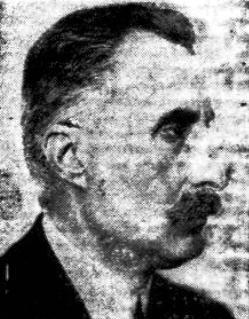
The Serbian National Theatre, located in Novi Sad, is one of the major theatres of Serbia.
Jovanović is the most common Serbian surname. It derives from Jovan, which is comparable to John in English. The part ov designates possession: Jovanov means John's. The suffix ić is a diminutive designation, or descendant designation. It is spelled in Austria as Jovanovic. So, the last name can be translated as John's son leading to the English equivalent last name of Johnson.

The Mayor of Belgrade is the head of the City of Belgrade. The Mayor acts on behalf of the city, and performs an executive function in the City of Belgrade. The position is important as the city is the most important hub of economy, culture, science and technology in Serbia.
Džemijet was a political party of the Muslim population in the Kingdom of Serbs, Croats, and Slovenes. It represented Albanians, Slavic Muslims and Turks in what was then "Southern Serbia". It was formed in August 1918 and officially constituted in Skopje in late 1919. The party participated in the 1920 and 1923 elections, in which it elected 8 and 14 representatives respectively. In January 1925 the party's leader Ferhat Draga, an Albanian nationalist who had previously served as mayor of Mitrovica, was arrested and soon after the party was disbanded.
The People's Radical Party was a populist political party in Serbia and later Kingdom of Serbs, Croats and Slovenes. Led by Nikola Pašić for most of its existence, its ideological profile has significantly changed throughout its history, shifting from socialism and radicalism towards conservatism in the early 20th century.
Constitutional Assembly elections were held in the Kingdom of Serbs, Croats and Slovenes on 28 November 1920. The Democratic Party emerged as the largest faction, winning 92 of the 419 seats. Deputies are elected by secret ballot, in a direct manner, by the electoral quotient system. The 1920 elections were the first democratic elections in the Kingdom of Serbs, Croats and Slovenes. Shortly after the election, the Communist Party of Yugoslavia was banned by the authorities.
Parliamentary elections were held in Yugoslavia on 5 May 1935. The result was a victory for the governing Yugoslav National Party (JNS), which won 303 of the 370 seats in Parliament.

Ljubomir Davidović was a Yugoslav and Serbian politician who served as prime minister of the Kingdom of Serbs, Croats, and Slovenes.
Vuk Karadžić, is а Yugoslavian historical drama television series which depicts the life and work of Vuk Stefanović Karadžić, a Serbian linguist and reformer of the Serbian language.

Milan Grol was a Serbian literary critic, historian and politician. He was also director of the National Theatre in Belgrade.
Croatian Popular Party was a minor political party that acted as a political branch of the Croatian Catholic Movement and it existed between 1919 and 1929 in the Kingdom of Serbs, Croats and Slovenes. Until Stjepan Radić's assassination in National Assembly in Belgrade in 1928, the Croatian Catholic Movement was pro-Yugoslav, and after the assassination pro-Croatian within Yugoslavia. However, after the failure of the Yugoslav government to implement the concordate with the Holy See, the Croatian Catholic Movement became strictly pro-Croatian.

Miloš Trifunović, also known as Miša Trifunović, was a Serbian and Yugoslav politician who held several important offices in the Kingdom of Yugoslavia and briefly served as the prime minister of the Yugoslav government-in-exile during World War II. Before becoming a member of parliament in 1903, he was a professor at Užice Gymnasium, a Serbian high school. During World War I, he was appointed the minister of education. During his tenure, he focused on improving the education of Serbs abroad. He served as the minister of education of Yugoslavia multiple times and also held several other ministerial positions.







